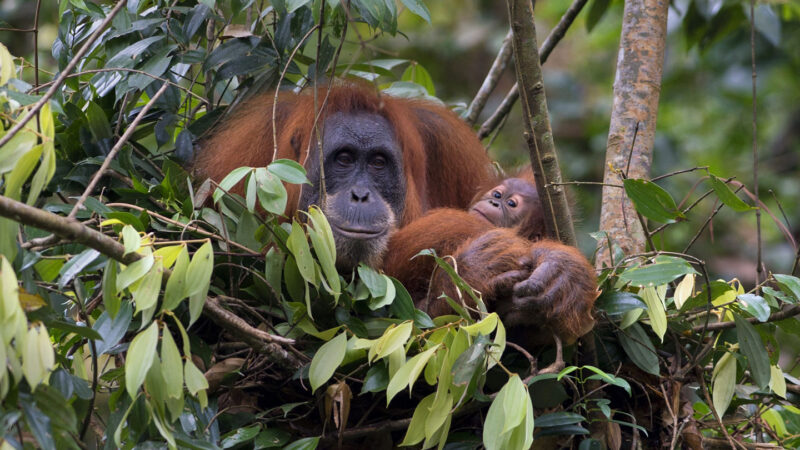The word orangutan means “person of the forest” — a good name for a group of primates that spend most of their time in trees. These great apes have long arms and long, curling fingers and toes for grasping branches. This helps them move easily through forest treetops on the Southeast Asian islands of Sumatra and Borneo.
Orangutans are more solitary than other great apes, such as chimpanzees and bonobos (and humans!). Adult male orangutans mostly live alone. But mama orangutans and their babies have a tight bond. Young orangutans tend to stay with their mothers for around seven years. And they’re even known to nurse for that long. While growing up in their mother’s care, young orangutans learn to build nests, sometimes starting as young as a few months old.
See all the entries from our Let’s Learn About series
Nest-building isn’t the only example of orangutan smarts. These primates have been known to use tools for crushing nuts or insects to eat. And an orangutan was the first wild animal ever reported using a plant with healing properties to treat a wound.
There are three known species of orangutans: Sumatran, Bornean and Tapanuli. All three are critically endangered. Tapanuli orangutans, only discovered in 2017, are the most endangered of all great apes. No more than 800 of them are alive today. The greatest threats to orangutans are forest clearing and hunting — which means it is largely up to people to ensure these clever primates don’t go extinct.
Want to know more? We’ve got some stories to get you started:
Wild medicine! An orangutan treated his wound with a local plant This great ape, living in Indonesia, doctored the gash on his face with a plant that people living in the area use as a natural medicine. (7/18/2024) Readability: 7.6
Orangs nurse young for more than eight years! Orangutan moms and babies have been tricky to study in the wild, so researchers used dental tests to reveal a record setting nursing period. (6/19/2017) Readability: 6.3
‘Boot camp’ teaches rare animals how to go wild Scientists teach endangered species raised in captivity, such as orangutans, vital skills for living in the wild. (5/31/2018) Readability: 7.2
Watch a one-year-old Bornean orangutan show off her nest-building skills.
Explore more
Explainer: What is an endangered species?
Let’s learn about chimpanzees and bonobos
No more than 800 orangutans from this newly identified species remain (from Science News)
Sumatran orangutans start crafting their engineering skills as infants (from Science News)
Ancient giant orangutans evolved smaller bodies surprisingly slowly (from Science News)
Social mingling shapes how orangutans issue warning calls (Science News)
Activities
Want to see an orangutan in action? Check out the El Paso Zoo’s two camera feeds from its orangutan habitat or the San Diego Zoo’s broadcast of its ape habitat.
Do you have a science question? We can help!
Submit your question here, and we might answer it an upcoming issue of Science News Explores




